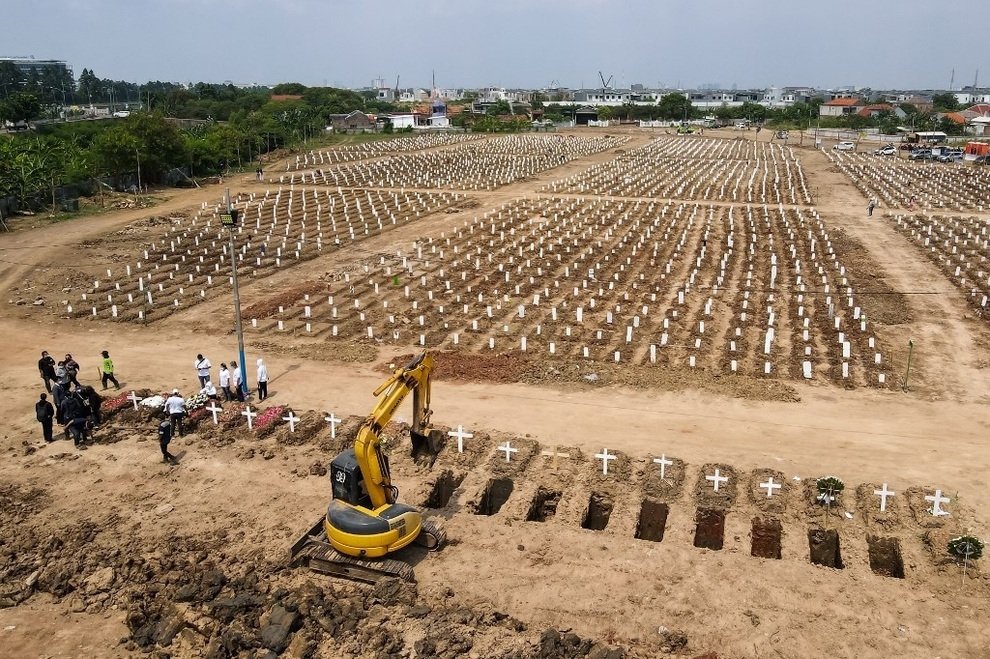(Dan Tri) – From Indonesia, Thailand to China or Japan…, the Delta mutation is attacking a series of successful anti-epidemic models in Asia and leaving many countries in a dire situation.
Aerial photo taken on August 4 of Rorotan cemetery in Jakarta (Indonesia), where Covid-19 victims are buried (Photo: AFP).
Up to now, nearly a year and a half have passed since the outbreak of the Covid-19 pandemic, the latest data are showing a worrying reality: the epidemic situation due to the Delta variant has a super infectious speed.
Southeast Asia is struggling because of Delta
In Indonesia – a current world epidemic epicenter, the number of infections and deaths has decreased compared to the peak of the second outbreak in mid-July but the number is still at an alarming level.
Virologists have warned about the risk of Indonesia becoming an `incubator` for new mutations – something that often happens when viruses spread rapidly in countries with large populations.
In the Philippines, on August 13, the Ministry of Health recorded 13,177 new cases, the second highest level after April 2, bringing the total number of infections in the country to 1.713 million.
The Delta strain is also raging in Myanmar.
When Thailand faced a strong wave of Delta attacks, Prime Minister Prayuth Chan-ocha’s government had to issue an emergency decree.
Malaysia on August 14 also recorded 20,670 new cases of infection and 260 deaths, bringing the total number of survivors to 12,228 people.
Japan is racing to distribute oxygen, Australia is speeding up vaccination

Japan is facing an increase in Covid-19 cases every day (Photo: Reuters).
Not only Southeast Asia, Asia is also an epidemic hot spot in East Asia when major countries such as Japan, China or South Korea are struggling to prevent the worrying wave of Delta’s spread.
But despite containment efforts, new infections in Japan rose to a record high of more than 20,000 cases on August 13.
Speaking to reporters, Prime Minister Suga Yoshihide said the pandemic had put Tokyo’s medical care system `in an extremely difficult situation`.
As of August 13, a total of 16 districts in Tokyo were at risk level, a move that showed the virus was spreading across the country.
In the context of the Delta variant spreading rapidly and showing no signs of abating, Prime Minister Suga plans to hold talks with relevant ministers next week on expanding the state of emergency that has been issued in the following regions.
Prime Minister Suga also called on people to limit traveling or returning home during the summer vacation and avoid unnecessary outings and limit movement to avoid spread.
The situation in Korea is equally tense.
Korea on August 14 recorded 1,930 new infections per day, of which 1,860 were community cases, bringing the total number of cases nationwide to exceed 222,000.
On August 13, Prime Minister Kim Boo-kyum called on people to minimize travel and stay home with their families this weekend to prevent the spread of the disease.
In Australia, due to concerns about the Delta strain, the Australian government had to buy 1 million doses of the Pfizer vaccine from Poland to speed up vaccination for young people, the main subjects of virus transmission in epidemic hot spots.
Australia’s additional supply of Covid-19 vaccines comes in the context that the epidemic situation in New South Wales state is still tense as the number of new cases increases dramatically.

China recently had to conduct widespread testing for people to prevent an outbreak (Photo: Global Times).
In fact, even the Chinese anti-epidemic model has been penetrated by Delta.
The latest wave of COVID-19 in China began to break out on July 20 in Nanjing city, capital of Jiangsu province, and has spread to 48 cities in 18 provinces, infecting 1,282 people as of now.
Mr. Zeng Guang, Head of the Epidemiology Team at the Chinese Center for Disease Control and Prevention (CDC), said the Delta variant is 10 times more difficult to control than the original virus, posing a great challenge to the campaign.
